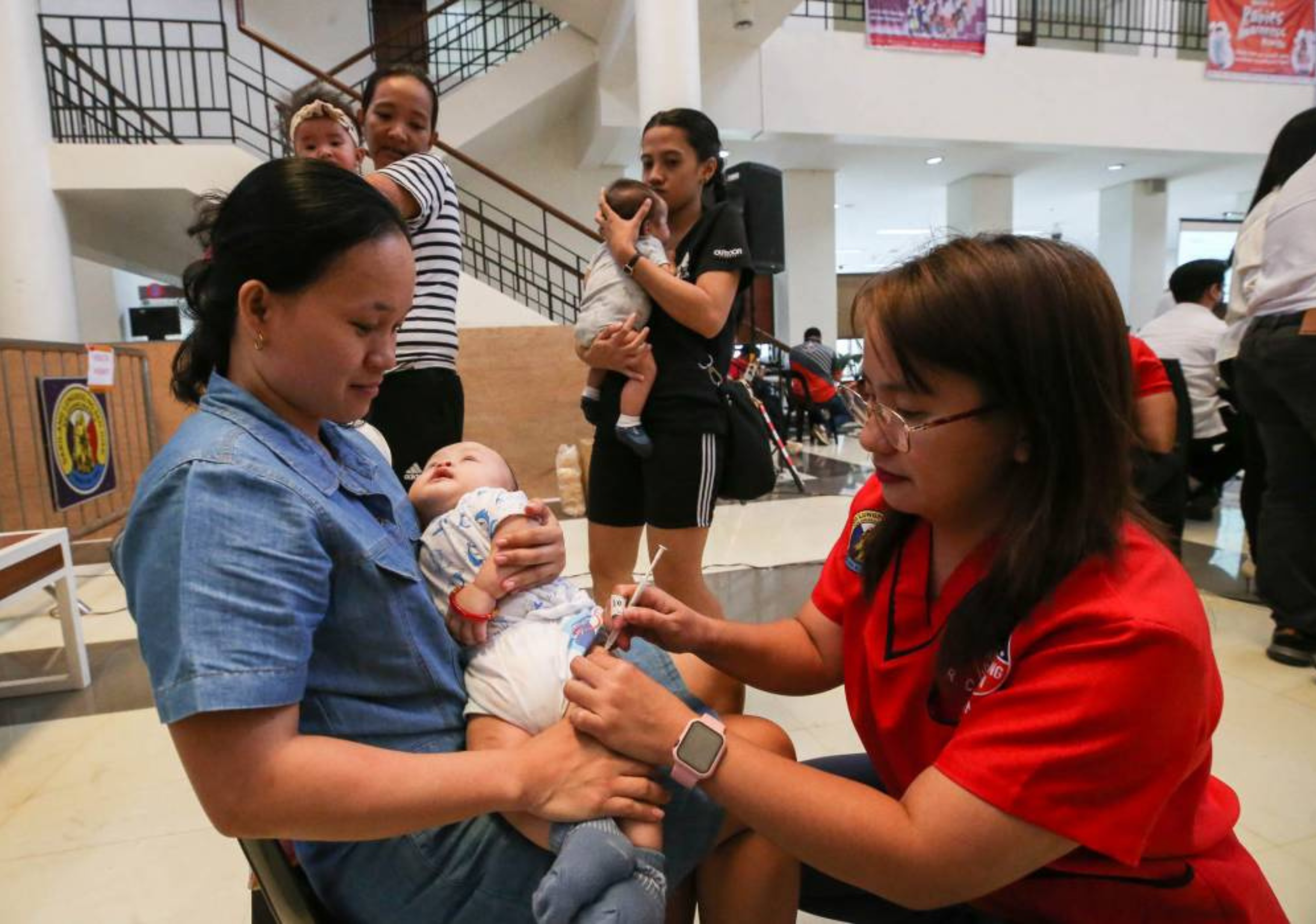Urgent appeal to older kids, adults: Get vaxxed vs pertussis

Parents had their babies and young children vaccinated against preventable diseases, including pertussis. INQUIRER PHOTO/LYN RILLON
MANILA, Philippines — The Philippine College of Physicians (PCP) has urged vaccination and booster shots not only for infants but also older children as well as adults following the infection of more than 500, mostly unvaccinated children, with pertussis or whooping cough.
In a statement on Monday, PCP, the umbrella organization of internists in the country, expressed “deep concern” over the surge of pertussis cases and stressed “the critical role of vaccination as the most effective method for preventing outbreaks.”
PCP “highly recommends” children get the three-dose primary immunization series vaccine against pertussis at six weeks, 10 weeks and 14 weeks.
READ: DOH: 40 child deaths due to pertussis logged so far this year
READ: 8M jabs coming as DOH sees more pertussis, measles outbreaks
Article continues after this advertisementThe National Immunization Program of the Department of Health (DOH) provides these primary shots through the pentavalent (5-in-1) vaccine, available for free in barangay health centers. The vaccine protects children against pertussis, diphtheria, tetanus, hepatitis B, and Haemophilus influenzae type B.
Article continues after this advertisementSingle booster
PCP also urged parents to have their children get a booster dose at 12-18 months old and another booster between 4 and 6 years old.
Vaccine booster shots to protect against whooping cough are either DTAP or TDAP, which also protect against tetanus and diphtheria. DTAP is given to infants and young children, while TDAP is for older children and adults.
According to PCP, adolescents who have completed the recommended DTAP series should receive a single TDAP booster recommended between 9 and 18 years old.
READ: Garin: Reemergence of pertussis is due to previous admin’s lapses
Adults aged 19 to 64 years old, as well as adults aged 65 and older who have not previously received a TDAP booster, should also receive one booster dose, “particularly if contact with infants is anticipated.”
The TDAP vaccine is strongly suggested for pregnant women of all ages, ideally in the third trimester (between 27 and 36 weeks) of each pregnancy.
For those who are particularly susceptible or have not been vaccinated previously, the TDAP vaccine may also be administered during the first trimester.
The DTAP and TDAP booster shots, however, are not provided for free in health centers. These vaccines are also not included under any of the benefit packages of the Philippine Health Insurance Corp.
At least P2,000
One needs at least P2,000 in out-of-pocket expenses for a single shot of DTAP or TDAP.
PCP, an affiliate society of the Philippine Medical Association and a member society of the International Society of Internal Medicine, assured the public of the effectiveness of vaccines in preventing pertussis and protecting patients from its severe complications.
“Studies have consistently shown that pertussis vaccine significantly decreases the incidence of pertussis by over 92 percent, and 97 percent in reducing mortality rates. In fully vaccinated individuals, the symptoms tend to be less severe, with a reduced likelihood of experiencing prolonged coughing spells, apnea (stoppage of breathing while asleep) and cyanosis (bluish color of the skin, lips and nail beds caused by a shortage of oxygen in the blood),” the medical organization said.
It also allayed fears of vaccine hesitancy among the public. It noted that “extensive safety evaluations have confirmed that TDAP vaccines are safe for use in children and adults, pregnant women and seniors over 65, with no unexpected safety concerns reported.”
Pertussis is an acute respiratory infection caused by the bacteria Bordetella pertussis. The infection poses a significant threat, particularly among infants and young children who are at risk of severe symptoms and life-threatening complications and outcomes.
While teens and adults may experience milder symptoms, there is a risk of severe illness, especially for those with preexisting health conditions and the unvaccinated elderly population. INQ